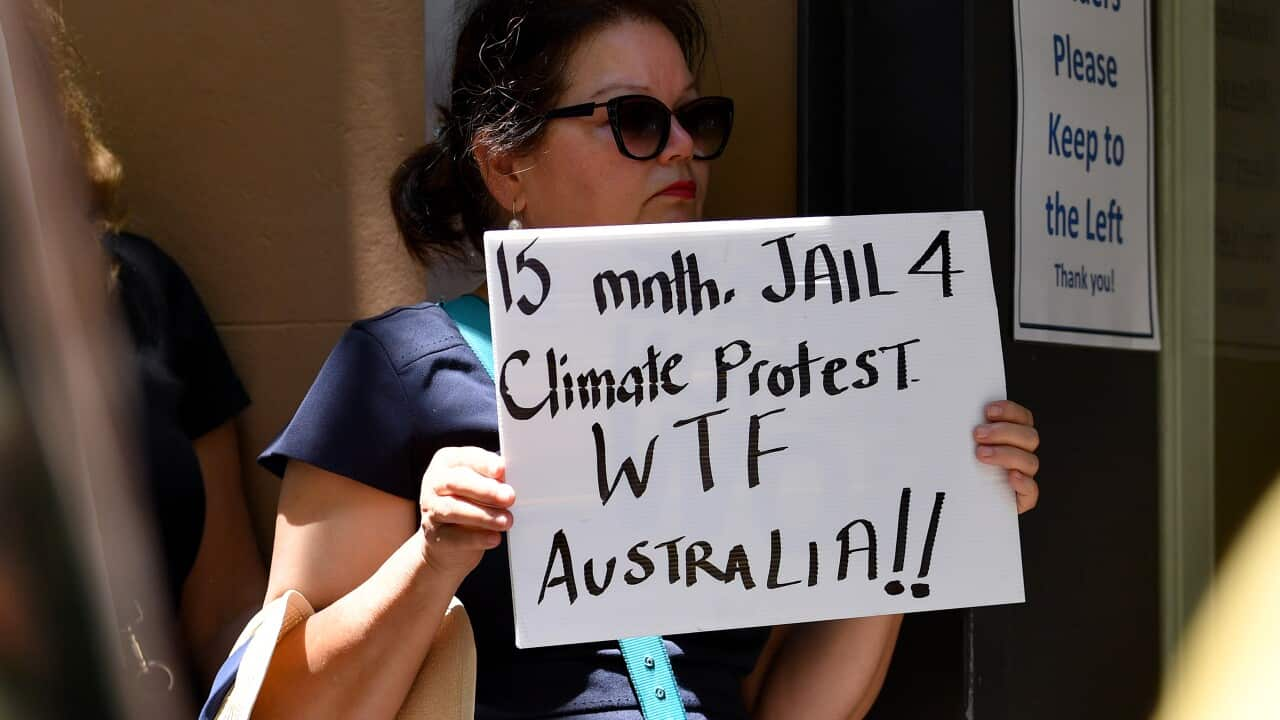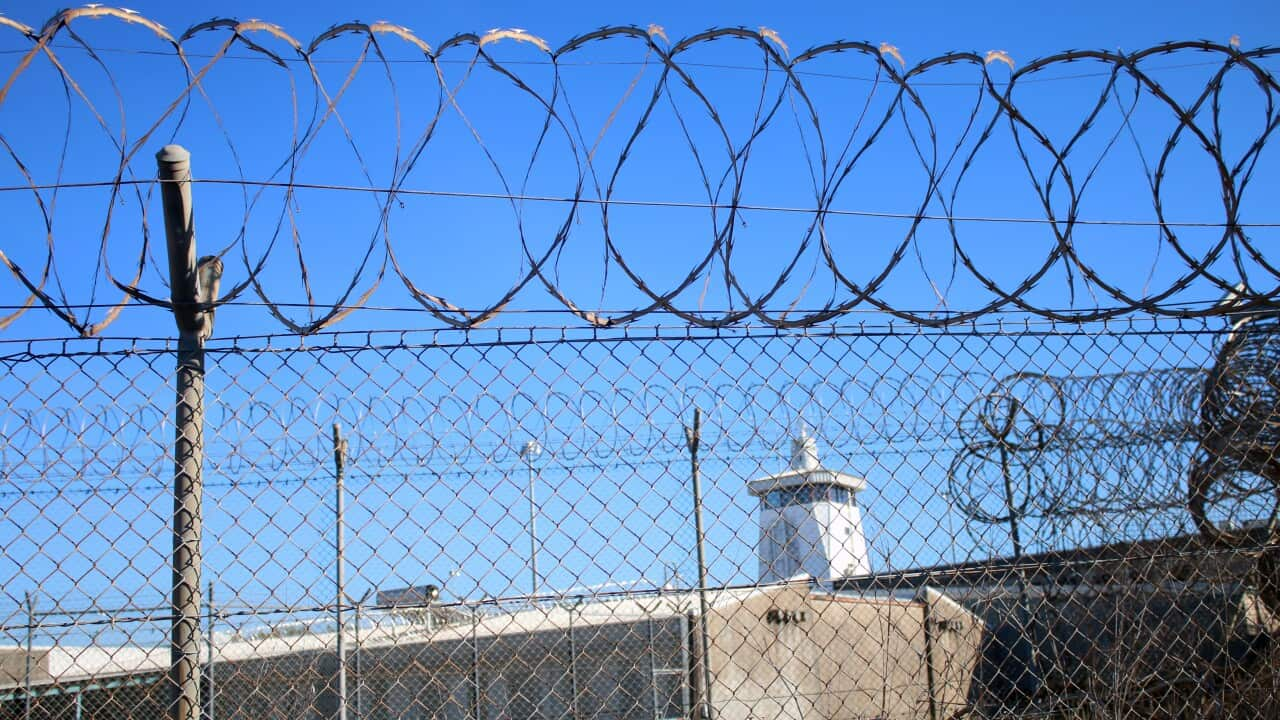KEY POINTS
- NSW protest laws were mentioned in a report which tracked the human rights practices of more than 100 countries.
- Human Rights Watch research found authorities in NSW were disproportionately punishing climate protesters.
- Australia’s record on Indigenous deaths in custody, asylum seekers and prison conditions were also highlighted.
Strict laws targeting climate protesters have been singled out for criticism in an assessment of human rights across Australia and the world.
It was these laws - introduced in NSW as part of a crackdown on protests causing inconvenience - which led to , who was part of a two-vehicle convoy that parked on Sydney Harbour Bridge to raise awareness of climate change.
Human rights violations by Russia in , as well as those committed by China and Ethiopia are among the “litany of human rights crises that unfolded in 2022” covered in the Human Rights Watch World (HRW) Report 2023.
Other areas highlighted by HRW relating to Australia included Indigenous deaths in custody, treatment of asylum seekers, children’s rights, prison conditions, and climate change policy.
Protest laws in the spotlight
The NSW government , with activists now facing fines of up to $22,000 and two years in prison.
"Human Rights Watch research found authorities in NSW were disproportionately punishing climate protesters and that magistrates were imposing harsh disproportionate penalties and bail conditions on climate protesters in violation of their rights," the report noted.

A number of matters relating to Australia;s human rights practices were included in Human Rights Watch's 2023 World Report, an annual review of human rights practices and trends around the globe. Source: Getty / Andriy Onufriyenko
New anti-protest laws in Victoria and Tasmania that also invoke severe penalties for non-violent protests were also referenced.
Indigenous deaths in custody
Australian researcher for Human Rights Watch Sophie McNeill said the shocking rise in the last year should be treated like the "urgent national crisis that it is".
The report noted that following the death of 11 Indigenous people in custody in Australia in 2021, another 17 Indigenous people died in custody last year.
The 2022 mentioned the government was considering exploring options for a national real-time deaths in custody reporting service, however, no further details or specific funding was set aside at that time.

It's been more than three decades since the Royal Commission into Aboriginal Deaths in Custody yet the issue remains. Source: AAP / Richard Wainwright
What does the report say about asylum seekers?
Australia’s policy of offshore processing of people who seek asylum in Australia was highlighted in the report, saying approximately 200 refugees and asylum seekers remained in detention in Papua New Guinea and Nauru.
It noted the Albanese government’s intention to continue Australia’s "turn back" policy, returning individuals to their countries of departure or origin.
While the report also mentioned the 4,000 Ukrainian asylum seekers who had arrived in Australia since February when Russia invaded the country and visas granted to Afghan nationals, Ms McNeill told SBS News many others had been waiting years for their visas.
"A lot of asylum seekers in Australia were really excited when the Albanese government got elected because they had promised to get rid of temporary visas, give those people permanent residence, and also to increase the number of humanitarian visas that Australia would grant," she said.
"We are urgently just waiting every day for those announcements."
Minister for Immigration, Citizenship and Multicultural Affairs Andrew Giles .
"The Albanese Government has made a commitment to transition those who have been found to be owed our protection on temporary protection visas to permanent protection – we will keep this promise, and meet our commitment as soon as possible," Mr Giles wrote on Twitter and Facebook.
Children’s rights and prison conditions
The report pointed out Australia’s minimum age of criminal responsibility remained lower than the internationally accepted age of 14.
A number of state and territory governments are looking at increasing this age and, in December, the Northern Territory became the first Australian state or territory to increase it to 12 years.
"We saw children in Banksia Hill Detention Centre in Western Australia, moved into an adult prison facility, which is not acceptable," Ms McNeill said.
"The prison inspector in Western Australia has described the conditions at Banksia Hill as inhumane, with children locked up in their cells for more than 23 hours a day."
Ms McNeill said it was "horrifying" that issues around the treatment of children in detention had been known about "for a long time, but that we turn a blind eye and that we are progressively getting worse".
"We also saw prisoners at Roebourne Prison, suffering in 50-degree heat without any air conditioning, which those conditions are clearly inhumane," she said.
Ms McNeill said Australia had obligations under international law and treaties to treat prisoners adequately and provide them with humane conditions.
"We're failing there," she said.
While the Western Australian government has recently pledged to install air-conditioning at Roebourne Prison, prisoners will have to endure at least one more summer without proper cooling as the work may not be carried out until 2024.
Climate change policy
The Human Rights Watch World Report 2023 acknowledged Prime Minister Anthony Albanese had pledged to end the divisive "climate wars" and legislated a 43 per cent emissions reduction target by 2030.
But it also said his government was "still actively supporting the expansion of fossil fuels industries, denying responsibility for emissions created by the vast amounts of coal and gas Australia exports overseas and flatly ruling out any discussion on banning new fossil fuel projects".



